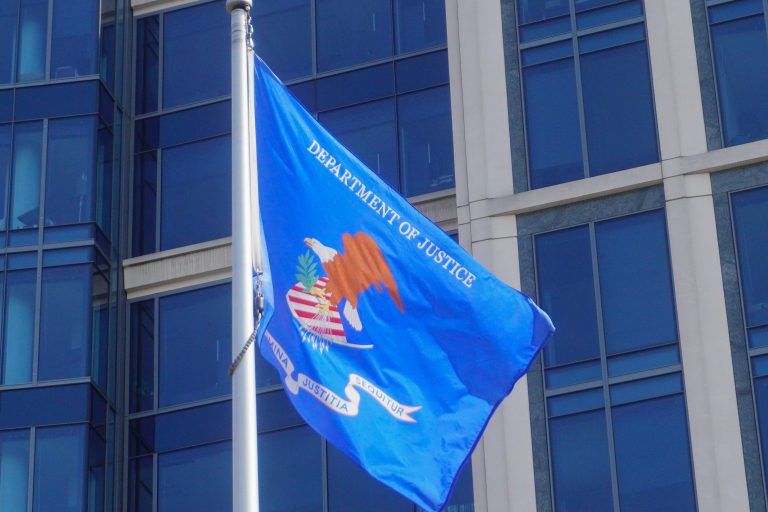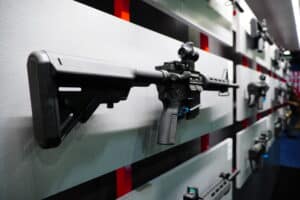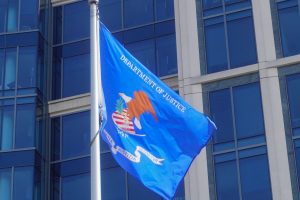The early days of the second Trump administration have seen just a few concrete actions on gun policy, mostly limited to federal personnel moves and procedural reforms. Now, it is firing a shot across the bow of states and localities pushing the envelope on Second Amendment restrictions.
On Thursday, the Department of Justice (DOJ) announced a formal investigation into the Los Angeles County Sheriff’s Department and its handling of concealed handgun license applications. The DOJ said it was concerned that the department has been engaging in “a pattern or practice” of subjecting applicants to excessive fees and wait times before they can exercise their right to bear arms.
“This Department of Justice will not stand idly by while States and localities infringe on the Second Amendment rights of ordinary, law-abiding Americans,” Attorney General Pam Bondi said in a press release launching the probe. “The Second Amendment is not a second-class right, and under my watch, the Department will actively enforce the Second Amendment just like it actively enforces other fundamental constitutional rights.”
What This Means
The 1994 crime bill passed by Congress authorizes the Attorney General to launch a civil investigation over police agencies for “a pattern or practice of conduct…that deprives persons of rights, privileges, or immunities secured or protected by the Constitution or laws of the United States.”
According to the DOJ, pattern or practice investigations typically involve “gathering information directly from community members,… interviewing police and local officials, gathering information from other criminal justice stake holders, observing officer activities through ride-alongs and other means, and reviewing documents and specific incidents that are relevant to the investigation.”
Following this evidence-gathering phase, the investigators will issue a public report detailing whether or not they identified any conduct violating constitutional or statutory rights. If they do, they will work to come to a negotiated agreement with the investigated department “that incorporates specific remedies and that becomes a federal court order overseen by an independent monitor.” If the department resists coming to an agreement, the law gives the Attorney General the authority to initiate a lawsuit to enforce its preferred reforms.
In the case of investigating the LA County Sheriff’s Department, others have already done some of that legwork. DOJ acknowledged it took inspiration from a 2023 lawsuit from the California Rifle and Pistol Association that accused the department of overseeing application processing times that frequently exceed 18 months, even though state law only gives jurisdictions 120 days to approve or deny an application. Last August, a federal judge issued a limited injunction against the department after finding that such delays likely violated the Second Amendment rights of two individual plaintiffs in the case.
“The Civil Rights Division has reason to believe that those two plaintiffs are not the only residents of Los Angeles County experiencing similarly long delays that are unduly burdening, or effectively denying, the Second Amendment rights of the people of Los Angeles,” DOJ said in the press release.
LA has a history of abusing its permitting system under its previous leadership, and additional anecdotal evidence of other applicants facing similar delays has continued to pile up in news reports and online forums.
However, whether that will be enough to amount to a formal finding of a pattern or practice of violating Second Amendment rights is less clear. While the Supreme Court has specifically warned against permitting systems “put toward abusive ends” with wait times, fees, or other impediments, it hasn’t actually defined a threshold or test for when those boundaries are crossed (though lower federal courts are starting to offer answers).
Ultimately, though, the goal of the investigation may be more geared toward using the threat of a federal probe to encourage the department to change its practices. The DOJ statement hinted at that.
“Attorney General Bondi hopes that states and localities will voluntarily embrace their duty to protect the Second Amendment rights of their citizens,” it reads.
More to Come
DOJ said this new investigation would be part of “a broader review” of restrictive firearm laws nationwide, though it accused California of being “a particularly egregious offender.”
That could mean similar investigations or other interventions into state and local firearms regulatory practices. Should it choose to do so, it will have plenty of potential targets within the Golden State.
As The Reload has previously reported, the City of San Jose currently charges more than $1,300 for concealed carry applicants. Localities like La Verne, Morgan Hill, and Santa Clara County also charge close to $1,000 for their permits. There are likely others charging similar rates. Those fees are well above what state law requires, and are an order of magnitude more than what many other states charge for permits.
The administration already appears to have its eyes set on jurisdictions outside of California as well.
On Friday, it announced a similar, though less antagonistic, initiative aimed at gun-carry permitting practices in Washington, DC—another jurisdiction notorious for drawing out the application process. A new executive order from President Trump on “Making the District of Columbia Safe and Beautiful.” The order establishes a new federal “D.C. Safe and Beautiful Task Force” that will, among other things, collaborate with local officials “to increase the speed and lower the cost of processing concealed carry license requests in the District of Columbia.”
Bondi also pledged to bring these investigations forward in “any other states or localities that insist on unduly burdening, or effectively denying, the Second Amendment rights of their ordinary, law-abiding citizens.”
That could draw in cities like New York City, for instance. The Big Apple is a frequent target of gun owners’ ire over its own accusations of slow-walking permits. Though New York law caps permitting timelines to six months, the process frequently takes longer than a year or more, and the city is currently facing multiple lawsuits challenging those delays.
The Bottom Line
It remains to be seen what will ultimately come from the Trump administration’s new local Second Amendment focus. Formal investigations often move slowly, and the Justice Department’s bandwidth is likely already limited due to the administration’s flurry of action on other policy priorities.
But should it bear fruit, either by prompting new consent decrees or even preemptive policy changes by localities afraid of extra scrutiny, it could result in the biggest practical expansion of gun rights of any Trump Second Amendment initiative so far. After all, millions of people live in areas with the most onerous gun-carry permitting regimes–not to mention the many other gun restrictions that the DOJ could choose to target down the line.






